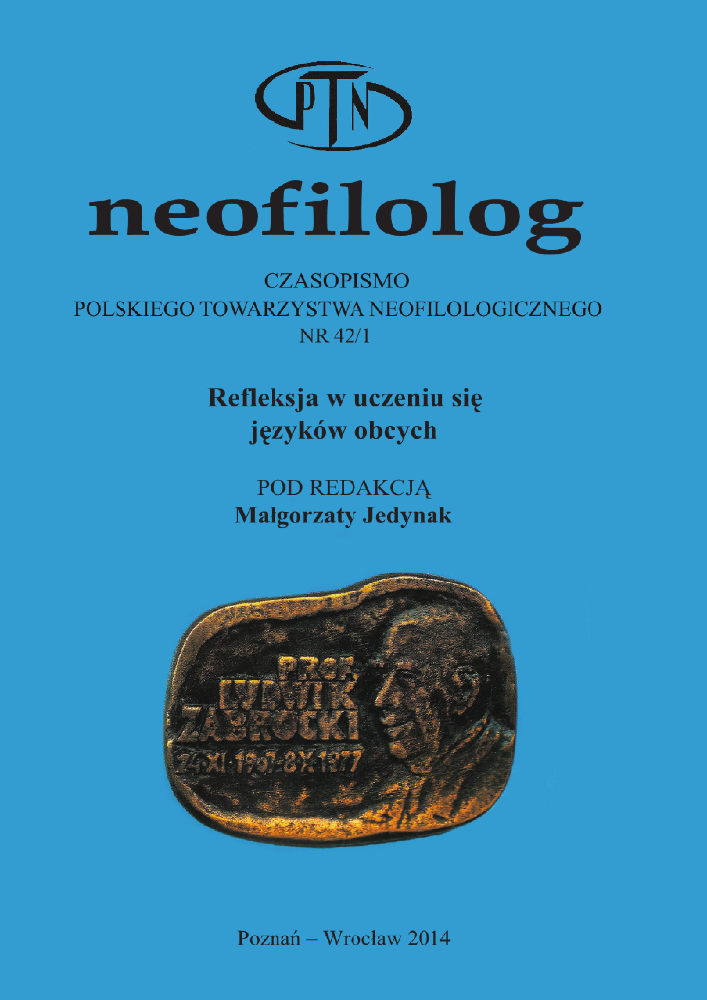Abstrakt
This paper reports on some of the data from a large-scale study Teaching and Learning Foreign Language in lower secondary school, which began in the school year 2011-12 and traces selected groups of learners through the three years of Key Stage 3 (gimnazjum), ending in school year 2013-14. The study was conceived and is managed by the Foreign Language Section of the Educational Research Institute (ERI) in Warsaw with European funding. (see Acknowledgement). In this article the focus is on data obtained from interviews conducted with learners from class one of 120 lower secondary schools, where the students were asked to describe and give opinions about learning English in their school and to imagine an ideal lesson. The learners are the reason that lessons in school take place, but their views are rarely consulted. This study attempts to redress the balance.Bibliografia
Bragg, S., 2007. Consulting young people: a review of the literature London: Creative Partnerships.
Cook-Sather, A, 2002. "Authorising students’ perspectives: toward trust, dialogue, and change in education". Educational Researcher. 31/4: 3-14.
Czerniawski, G and Kidd, W. 2011. The Student Voice Handbook: Bridging the aca-demic/practitioner divide. Bingley: Emerald Group Publishing.
Czyż, E. (n.d.) Prawa ucznia w szkole. Warszawa: Helsińska Fundacja Praw Człowieka. Retrieved from htp://www.bezuprzedzen.org/doc/Prawa_ucznia_w_szkole_HFPCz.pdf on 30.09.2013.
Flutter,J. and Ruddock, J. 2004. Consulting pupils: What’s in it for schools? London: Routledge Falmer.
Kozol, J. 1991. Savage inequalities: Children in America’s schools. New York: Harper Perennial.
Ministerstwo Edukacji Narodowej. 1992. Zarządzenie nr. 14 z dnia 19.06.1992 w sprawie ramowych statutów szkół publicznych.
Ministerstwo Edukacji Narodowej. 2009. Postawa Programowa z komentarzami. Języki Obce.
Oldfather, P. 1995. “Songs “come back most to them”: Students’ experiences as Researchers”. Theory into Practice, 43 (2):131-137.
Rudd, T., Colligan, F., and Naik, R., 2007. Learner Voice: A Handbook. Bristol: Future-lab. Ruddock, J. 2004. Pupil voice is here to stay! Retrieved from http://www.serviceschoolsmobilitytoolkit.com/resourcedownloads/staffroom/bpv_theneedtoinvolvepupilvoice.pdf on 30.09.2013
Ruddock, J. and Flutter, J. 2004. How to improve your school: giving pupils a voice, London: Continuum.
Strucker, M., Moise, L. N., Magee, and V. L., Kreider, H. 2001. “Writing the wrong: Making schools better for girls” (w:) In our own words: Students’ perspectives on school. J. Shultz i A. Cook-Sather (red.) Lanham, MD: Rowman & Littlefield: 149-164.
Licencja
Prawa autorskie (c) 2019 Melanie Ellis

Utwór dostępny jest na licencji Creative Commons Uznanie autorstwa – Bez utworów zależnych 4.0 Międzynarodowe.
Przedstawiany utwór (artykuł) upubliczniany jest na podstawie umowy z autorem i na licencji Creative Commons Attribution-NoDerivatives 4.0 International (CC BY-ND 4.0).
Użytkownicy mają obowiązek podania wraz z rozpowszechnionym utworem, informacji o autorstwie, tytule, źródle (odnośniki do oryginalnego utworu, DOI) oraz samej licencji;
- bez tworzenia utworów zależnych,
- utwór musi być zachowany w oryginalnej postaci.
Uniwersytet im. Adama Mickiewicza w Poznaniu zachowuje prawo do czasopisma jako całości (układ, forma graficzna, tytuł, projekt okładki, logo itp.).
